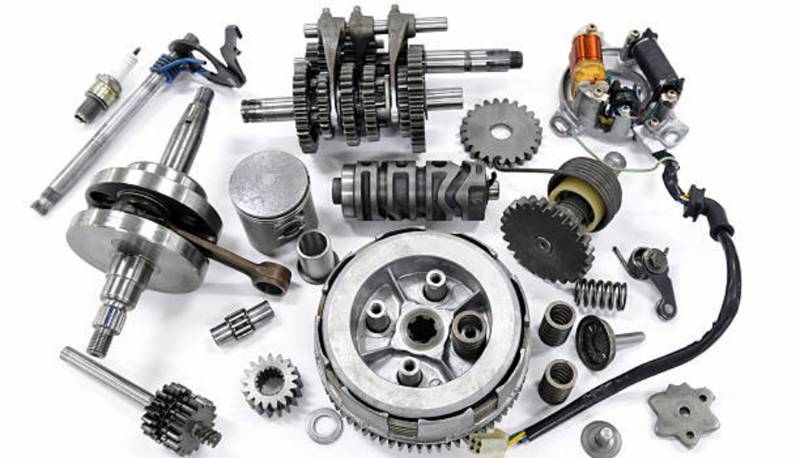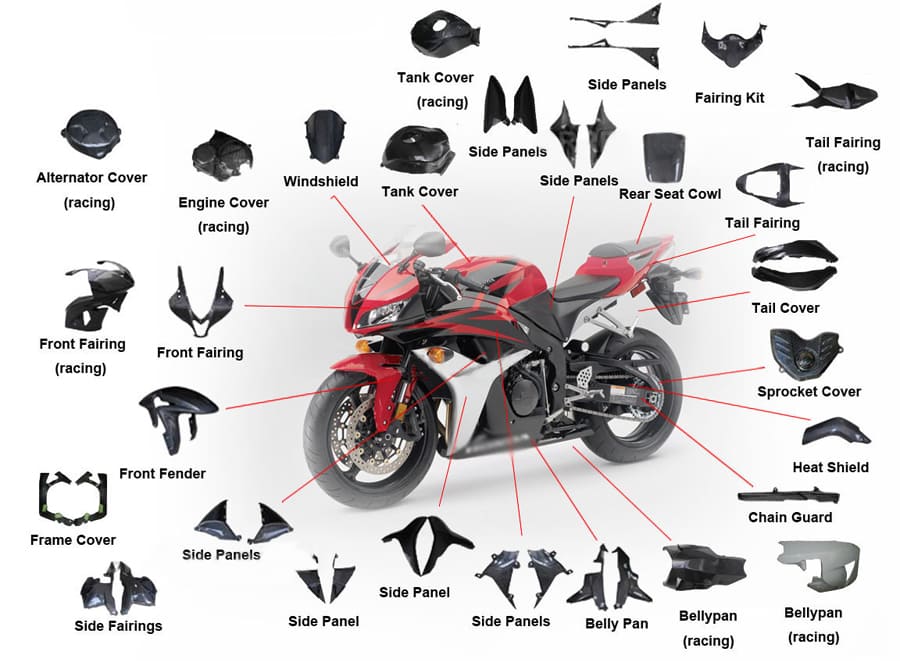Discover the Essential MotorBike Components You Need for Optimal Efficiency
Understanding the vital parts of a motorcycle is fundamental for attaining peak performance. Each component, from the engine to the braking system, plays a critical role in total capability and security. Normal upkeep can prevent unanticipated failures and improve the riding experience. Several bikers forget the intricacies of these systems. Discovering how they function together can cause an extra effective ride. What important components should every biker prioritize?
The Engine: The Heart of Your Bike
The engine serves as the core part of a motorcycle, driving its performance and specifying its abilities. It is responsible for transforming fuel right into mechanical power, which powers the bike forward. Different types of engines are utilized, including single-cylinder, V-twin, and inline configurations, each offering distinctive characteristics matched for different riding purposes and designs. The engine size, generally gauged in cubic centimeters (cc), substantially affects efficiency, with larger engines normally giving more power and torque.Furthermore, the engine's design and technology, such as gas shot systems or air-cooling versus liquid-cooling, impact performance and reliability. Maintenance is essential for peak procedure; aspects like routine oil modifications and checking trigger connects assurance durability. Riders often think about an engine's responsiveness and smoothness, as these attributes improve the overall riding experience. Eventually, the engine remains a critical component that specifies not just the motorcycle's efficiency however also the cyclist's connection to the equipment.
The Transmission: Changing Gears Smoothly
The transmission plays a crucial function in a motorcycle's performance, especially in the technicians of gear changing. Understanding just how to move gears efficiently can enhance the total riding experience, while normal upkeep assurances peak capability. Appropriate interest to these elements can considerably impact the longevity and efficiency of the motorbike.

Equipment Shifting Mechanics
Smooth equipment shifting is important for ideal motorbike efficiency, greatly impacting both velocity and control. The technicians of gear changing entail the interaction between the clutch, equipment lever, and transmission system. When a biker involves the clutch, it disengages the engine from the transmission, permitting a gear modification without damaging the parts. A well-timed release of the clutch, combined with exact activity of the gear lever, assists in a smooth change in between equipments. This procedure ensures that the engine operates within its finest power band, enhancing performance. Oem Parts New Zealand. In addition, understanding the equipment proportions and their effect on speed and torque can assist cyclists make informed options throughout changes, ultimately contributing to a much more satisfying and receptive riding experience
Maintenance Tips Significance
Routine maintenance plays a vital function in assuring that the transmission system runs successfully, enabling smooth equipment shifts. Consistently transforming the transmission and inspecting fluid is crucial, as old liquid can cause boosted friction and wear. Additionally, examining the clutch for wear guarantees peak involvement and disengagement, stopping slippage throughout gear changes. Lubrication of relocating parts is equally vital to minimize friction and boost efficiency. Motorcycle proprietors need to additionally keep an eye on for leaks and unusual noises, as these can indicate underlying problems. By sticking to these maintenance pointers, riders can prolong the life-span of their transmission system, assuring that equipment shifts stay smooth and contributing to the general efficiency of their motorbike.
The Braking System: Ensuring Safety And Security on Every Experience
Braking systems are essential parts that straight influence a motorbike's safety and efficiency. They contain numerous parts, consisting of brake pads, rotors, calipers, and hydraulic lines, all interacting to assure effective deceleration. The kind of braking system-- generally either disc or drum-- influences responsiveness and quiting power.Regular maintenance is necessary to maintain peak efficiency; worn brake pads can cause decreased effectiveness and boosted stopping distances. Furthermore, the top quality of brake fluid must be monitored, as it can soak up wetness with time, compromising stopping efficiency.Riders must likewise take into consideration the importance of anti-lock stopping systems (ABS), which avoid wheel lockup throughout abrupt quits, enhancing general safety. Correctly working brakes are not simply concerning quiting; they impart self-confidence in the biker, enabling more secure navigation via different terrains. Ultimately, a reliable braking system is vital for delighting in every adventure with tranquility of mind.
The Suspension: Enhancing Convenience and Control
A well-functioning suspension system significantly contributes to a motorcycle's total efficiency, matching the efficiency of the braking system. The suspension plays a considerable role in absorbing shocks from unequal surfaces, guaranteeing a smoother adventure while maintaining tire call with the roadway. This get in touch with is important for both security and control, enabling bikers to browse corners with confidence and precision.Different sorts of shock absorber, such as telescopic forks or mono-shocks, use differing levels of convenience and handling. Appropriately tuned suspension enhances responsiveness, providing the cyclist with an extra connected feeling to the motorbike. Normal maintenance checks are essential to identify the suspension components, consisting of springs and dampers, are working at their ideal. A reliable shock absorber not only raises the riding experience yet likewise adds to the durability of other motorcycle parts by decreasing wear and tear. Therefore, purchasing top you could try this out quality suspension is important for any significant motorbike fanatic.
The Tires: Linking You to the Roadway
Tires play an essential duty in a motorcycle's performance, serving as the main link between the cyclist and the road. Comprehending the various sorts of tires offered can greatly affect taking care of and safety. Furthermore, normal maintenance is crucial to ensure peak tire performance and longevity.
Tire Enters Explained
Just how do different tire types influence a motorcycle's efficiency? Tire types play a vital role in determining a motorbike's security, handling, and grasp. Sporting activity tires, designed for high performance, offer improved grip and responsiveness on paved roads, making them optimal for competing and aggressive riding. Alternatively, touring tires prioritize longevity and comfort, offering a smoother experience for long-distance travel. Off-road tires, identified by their rugged step patterns, master traction on unpaved surface areas, suitable for experience fanatics. In addition, dual-sport tires mix attributes from both on-road and off-road classifications, satisfying flexible riding demands. Eventually, picking the appropriate tire type is crucial for maximizing performance, making sure security, and improving the overall riding experience.
Maintenance Tips Offered
While riding when driving, maintaining ideal tire condition is important for safety and security and efficiency. Regularly examining tire stress is very important, as under-inflated tires can bring about bad handling and enhanced wear. It is recommended to examine tread deepness frequently; worn tires concession grip and security. Furthermore, bikers must try to find signs of damages, such as lumps or cracks, which can show the requirement for replacement. Revolving tires regularly assures also use, boosting durability. Maintaining tires tidy from debris and preventing too much curbs can extend their life-span. Lastly, preserving proper positioning and equilibrium adds to come to a head performance, decreasing tension on various other bike elements. Sticking to these upkeep suggestions will greatly boost the overall riding experience.
The Fuel System: Fueling Performance and Efficiency
The gas system plays an important duty in optimizing a motorbike's performance and efficiency, as it assures the optimum shipment of fuel to the engine. It comprises numerous vital components, consisting of the gas container, gas pump, gas filter, and fuel injectors or carburetor. Each component has to function effectively to ensure a smooth and effective ride.The gas tank shops gas and provides it to the engine by means of the gas pump, which creates the essential stress. A fuel filter avoids contaminants from entering the engine, while the injectors or carburetor mix gas with air for combustion.Proper upkeep of the gas system is crucial; a clogged filter or malfunctioning injector can cause lowered efficiency and raised gas usage. By verifying that the fuel system operates efficiently, cyclists can enjoy improved throttle response, much better gas economic climate, and generally improved riding experience.
The Electrical System: Powering Your Experience
An effective electrical system is essential for the total capability and safety and security of a motorcycle, as it powers important elements such as the ignition, lighting, and numerous digital systems. This system includes the battery, which stores power, and the generator, in charge of generating power while the engine runs. The electrical wiring harness links these elements, ensuring trustworthy power distribution.Additionally, merges safeguard the system from overloads, while relays help manage high-current devices with low-power signals. A well-maintained electric system enhances efficiency by ensuring smooth beginnings and constant operation of lights and signals, crucial for biker visibility and safety.Regular checks of the battery's fee and links are very important for preventing electric failings. Bikers need to likewise inspect circuitry for deterioration, ensuring all elements operate preferably. Ultimately, a robust electric system contributes substantially to the general efficiency and reliability of the motorcycle.
Regularly Asked Inquiries
Exactly how Frequently Should I Change My Bike's Battery?
The frequency of bike battery replacement depends upon usage and upkeep (Motorcycle Spares Christchurch). Normally, batteries need to be replaced every 3 to five years. Routine checks can help recognize when a replacement is required for peak efficiency
What Tools Do I Need for Standard Bike Maintenance?
For fundamental bike maintenance, one requires vital tools such as an outlet set, wrenches, screwdrivers, pliers, tire pressure scale, and a torque wrench. These devices facilitate effective upkeep and guarantee the bike runs efficiently and safely.
Exactly How Can I Boost My Bike's The rules of aerodynamics?
To boost bike aerodynamics, one should take into consideration adjusting fairings, utilizing windscreen extensions, optimizing body position, and decreasing general weight. These alterations help reduce drag, enhancing stability and gas performance throughout adventures.
What Are the Indicators of a Failing Electrical System?
Signs of a falling short electric system consist of lowering lights, problem starting, irregular instrument readings, and blown integrates. Bike Parts Wellington. Unusual smells or corrosion around battery terminals might discover here additionally indicate underlying issues needing prompt focus for safety and performance

How Do I Choose the Right Oil for My Motorcycle?
When picking oil for a motorcycle, one need to take into consideration the maker's you can try here specs, thickness scores, and the kind of riding. Furthermore, standard versus artificial oil can impact performance and engine protection, affecting the decision significantly. The engine size, generally measured in cubic centimeters (cc), considerably influences performance, with bigger engines usually supplying more power and torque.Furthermore, the engine's layout and modern technology, such as gas injection systems or air-cooling versus liquid-cooling, influence effectiveness and integrity. A well-functioning suspension system substantially adds to a motorbike's total efficiency, complementing the performance of the braking system. The gas system plays an important function in taking full advantage of a motorbike's efficiency and efficiency, as it assures the optimal distribution of gas to the engine. A fuel filter protects against pollutants from entering the engine, while the injectors or carburetor mix gas with air for combustion.Proper maintenance of the fuel system is vital; a blocked filter or malfunctioning injector can lead to lowered performance and boosted fuel intake. A well-kept electric system boosts efficiency by guaranteeing smooth beginnings and consistent operation of signals and lights, crucial for rider exposure and safety.Regular checks of the battery's charge and connections are essential for stopping electric failures.